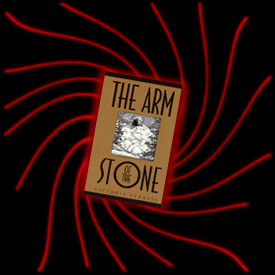 For the next ten years she hardly wrote but, as luck would have it, an agent took a shine to that early book, a historical novel set in the Middle Ages, and managed to sell it.
For the next ten years she hardly wrote but, as luck would have it, an agent took a shine to that early book, a historical novel set in the Middle Ages, and managed to sell it.
The product of equal parts pluck and luck, The Lady of Rhuddesmere set Strauss on a path she would continue to follow for years to come. Her historical bent, and interest in the medieval period combined with a fascination for mythology to produce her latest novel, The Arm of the Stone. This impressive work of fantasy uses traditional archetypes --"the quest, the fabulous object, the child with the great destiny" -- and takes them in directions they do not usually go. "Although the hero starts out on a quest to regain the fabulous object for his family and does eventually wind up taking it back," Strauss explains, "it isn't for the reasons with which he started out."
In Strauss' mind, fantasy deals more concretely, perhaps, than any other literary form, with archetypal figures, the same figures that appear in religions, fairy tales, and myths. "Fantasy is more than just escapist," she thinks. "Fantasy taps into some very deep consciousness in people, and speaks to deep and universal themes. The Arm of the Stone, for instance, begins with a family myth that predicts the hero's arrival and his ultimate destiny -- to restore everything to what it was. "The myth is central to him," Strauss says. "He gets swept up in it and resents it because he doesn't want to be forced into an action that isn't completely his own. At the same time he is compelled by it, because he believes it's true. But over the course of the story he learns to recognize it as myth and to understand that it is not restoration that is important, but change. In the end, though his actions fulfill the myth, they're no longer motivated by it."
In the end, the key to the novel's success is Strauss's trademark charcter-driven plot, intended to counter what she sees as the preponderance, in fantasy fiction, of a medieval-like world that has remained the same for a thousand years. "It's never explained how it got that way, why it stayed that way. In my medieval world, there's a specific reason why it is the way it is, and why it never developed. One thing I'm going to be exploring in the as yet untitled sequel to The Arm of the Stone is what it takes to break that stasis and let the world move forward.
Victoria Strauss lives in Poughkeepsie, New York, with her husband and three cats -- "obligatory for fantasy writers," she notes.
|

